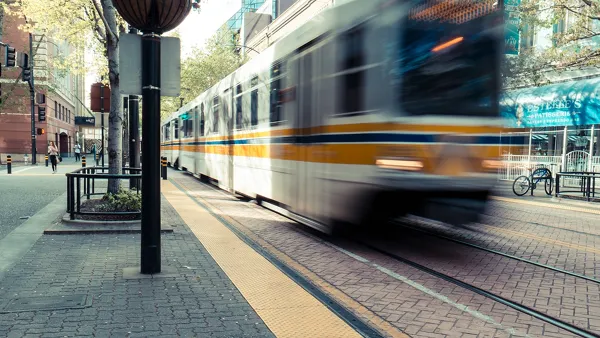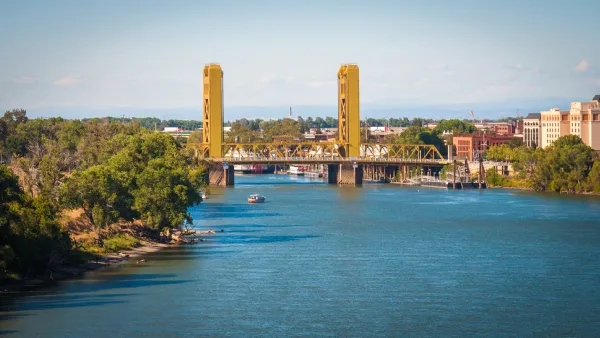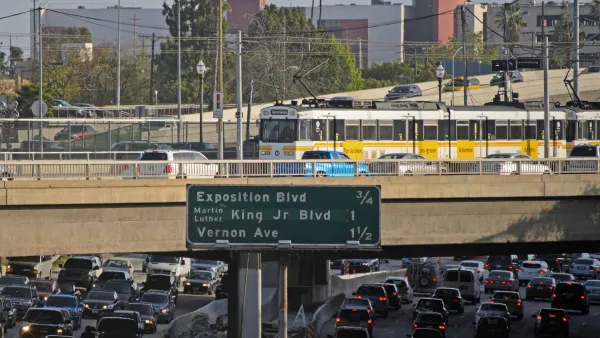Imagine taking a streetcar across Sacramento's iconic Tower Bridge for a three mile trip. Backers are en route to securing matching local funding for the project. However, local voters will have the final say in a June 2 Mello-Roos special election.
The $150 million streetcar project is banking on using federal funding to pay for half the costs, leaving mostly local sources to finance the other half.
"The Sacramento County Board of Supervisors approved $3 million for a downtown streetcar project on (April 7), writes Brad Branan of The Sacramento Bee, "completing the round of local government support needed for the $150 million project. West Sacramento plans to pay $25 million and the city of Sacramento will contribute $7 million."
"Supporters envision the streetcar... as another opportunity to drive economic development, along with the downtown [Sacramento Kings] arena under construction," adds Branan.
The big question mark in the funding scheme is the June 2 special election: Measure B: Sacramento Streetcar Community Facilities District.
“Shall the Sacramento City Council, acting through the Sacramento Streetcar Community Facilities District No. 2015-01, City of Sacramento, County of Sacramento, State of California (the “CFD”), be authorized to incur debt with a principal amount not exceeding $38,000,000...?"
It won't be a city-wide election—just for voters in a new district served by the streetcar.
The district is within the City's downtown and midtown areas-from the Sacramento River on the west to 22nd Street on the east, with northern and southern boundaries drawn generally within three blocks of the proposed streetcar line.
It must pass with two-thirds of the vote. Branan writes that "property owners have already agreed to pay the money in an advisory vote." Backers will seek a state grant for the remainder of the $75 million matching share, by my estimate, $2 million, though Branan writes it could be $10 million.
According to the Sacramento city attorney's impartial analysis printed in Measure B, "(t)he Mello-Roos Community Facilities Act of 1982 (the "Act") authorizes the City to establish community facilities districts as a means of financing certain public facilities."
In a 2003 Planetizen exclusive, "How We Pay For Growth (in California)," Bill Fulton, publisher of California Planning & Development Report and new director of Kinder Institute for Urban Research at Rice University, writes, "Parcel taxes, previously not permitted, are now common. Mello-Roos taxes were invented specifically to circumvent Proposition 13, and in the process created a municipal bonding mechanism that many on Wall Street still don't understand."
So if you are not familiar with Mello-Roos, you are in good company.
Hat tip to Jackie @ Climate Plan Weekly Update.
FULL STORY: Sacramento County approves $3 million for downtown streetcar project

Analysis: Cybertruck Fatality Rate Far Exceeds That of Ford Pinto
The Tesla Cybertruck was recalled seven times last year.

National Parks Layoffs Will Cause Communities to Lose Billions
Thousands of essential park workers were laid off this week, just before the busy spring break season.

Retro-silient?: America’s First “Eco-burb,” The Woodlands Turns 50
A master-planned community north of Houston offers lessons on green infrastructure and resilient design, but falls short of its founder’s lofty affordability and walkability goals.

Test News Post 1
This is a summary

Analysis: Cybertruck Fatality Rate Far Exceeds That of Ford Pinto
The Tesla Cybertruck was recalled seven times last year.

Test News Headline 46
Test for the image on the front page.
Urban Design for Planners 1: Software Tools
This six-course series explores essential urban design concepts using open source software and equips planners with the tools they need to participate fully in the urban design process.
Planning for Universal Design
Learn the tools for implementing Universal Design in planning regulations.
EMC Planning Group, Inc.
Planetizen
Planetizen
Mpact (formerly Rail~Volution)
Great Falls Development Authority, Inc.
HUDs Office of Policy Development and Research
NYU Wagner Graduate School of Public Service




























